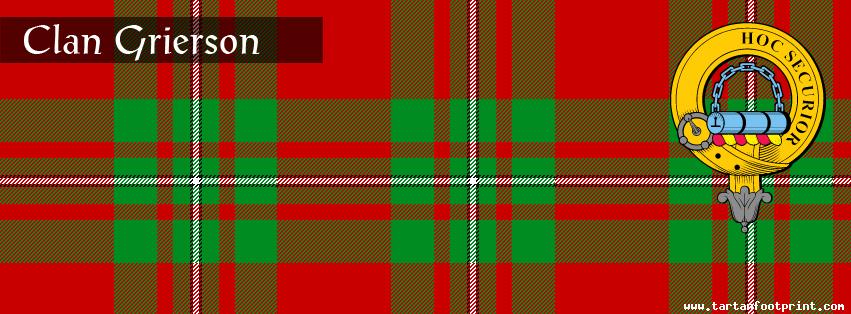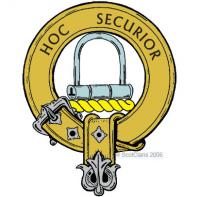
Clan Grierson
It was thought the the name Grierson was derived from Gregor, or MacGregor however no relationship has been found to support this. The family are first recorded to have settled on the lands of Lag around 1408. Gilbert Grierson was recorded as ‘armour bearer’ to the Earl of Douglas in 1420.
He was related to the Douglas Clan through marriage. his wife Janet was great grand-daughter of the fourth Earl of Douglas and Princess Margaret.
Vedast Grierson of Lag who had built a strong defensive tower had a son Roger. He was killed at Sauchieburn in 1488. Subsequent lairds were also killed at Flodden. As well as the powerful Douglas clan the Griersons also had a close relationship with the Maxwell family. This alliance was neccesary when they both took on the Johnstones at the Battle of Dryfe Sands in 1593.
William Grierson of Lag was knighted by James VI around 1608. He had a son Robert who's cousin (also Robert) followed in succession and became the first Baronet of Lag, he is still known as 'Auld Lag'. Sir Robert was particulary dilligent in attempting to crush the Covenanters who worshipped illegally in south west Scotland. He was involved in a near massacre in Kirconnell and gained a fearsome reputation that almost cost him his life. Sir Robert married Lady Henrietta Douglas, sister of the Duke of Queensberry, strengthening the bonds between these two lowland families. He was arrested in 1689 and later accused of conspiracy to counterfeit money. Sir Robert's life became the inspiration for Sir Walter Scott's Red Gauntlet.
His eldest son, William, died without an heir, and his brother, Sir Gilbert, succeeded to the title.
The 3rd Baronet of Lag was Robert Grierson, born circa 1700, the son of James Grierson (The 2nd son of the 1st Baronet of Lag). Robert Grierson incurred the displeasure of the 'Auld Lag' and of William his uncle, he was expressly cut off from succeeding to the family estates. This was done by a 4th deed which 'Auld Lag' executed a few days before his death, namely on the 20th December, 1733. In it Sir Robert's name is removed from the series of heirs. It was to no avail that on his uncle's death, he took out breaves and had himself served heir to the estates; but he could not be excluded from succession to the family title, and he became 3rd Baronet of Lag in 1764, on William's death.
The 4th Baronet of Lag was also the son of the 1st Baronet of Lag, Sir Robert Grierson and Dame Henrietta Douglas. Their son Sir Gilbert Grierson (16th Chief and 4th Baronet of Lag) was born around 1690/93 and died in 1766 at Dalkeith in Midlothian. Sir Gilbert worked as Chamberlain to the Duke & Duchess of Buccleuch, 1722-1765. He worked to pay off the arrears due by tenants of of lordship of Dalkeith and barony of East Park alias Smeaton.
Several Griersons had a distinguished military career, Thomas Grierson, fought at the siege of Delhi in 1857, the eighth Baronet, Sir Alexander Grierson of Lag, was an officer in the 78th Ross-shire Highlanders and the tenth Baronet, Sir Robert Grierson of Lag, served in the King’s Own Scottish Borderers during the Great War.
Sir George Abraham Grierson had a talent for languages. he became an expert in the languages and dialects of india and published a Linguistic Survey of India with information on around 364 of them. for his work he was knighted in 1912
Dr John Grierson was a pioneer of documentary film-making. Educated in Glasgow and Chicago he helped set up the National Film Board of Canada in 1939 and was also a director of UNESCO and later film controller for the British Central Office of Information until 1950.







